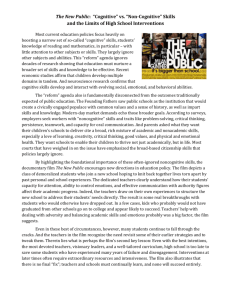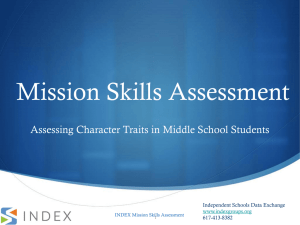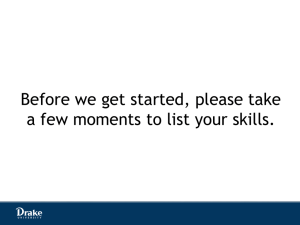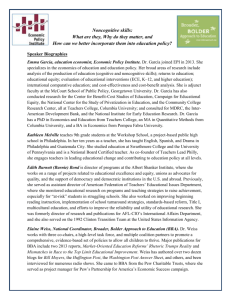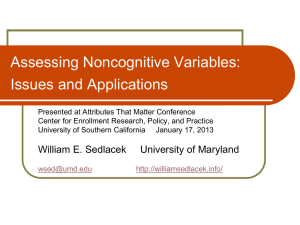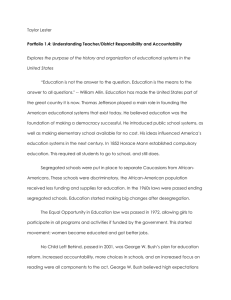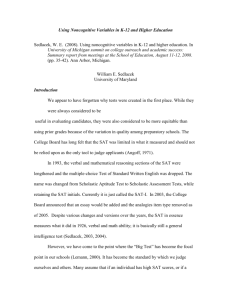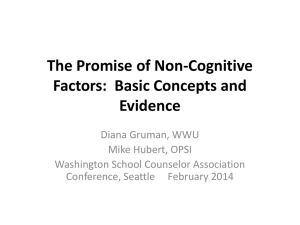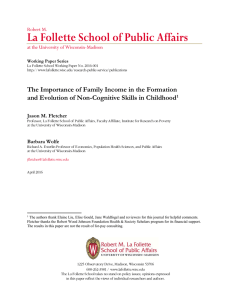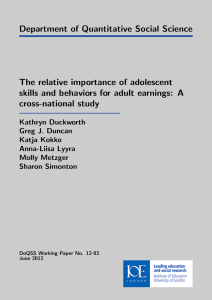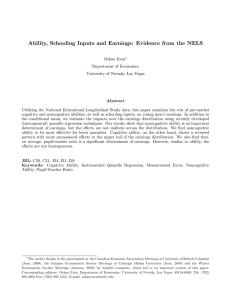a 2-page BBA brief - Broader, BOLDER Approach to Education
advertisement
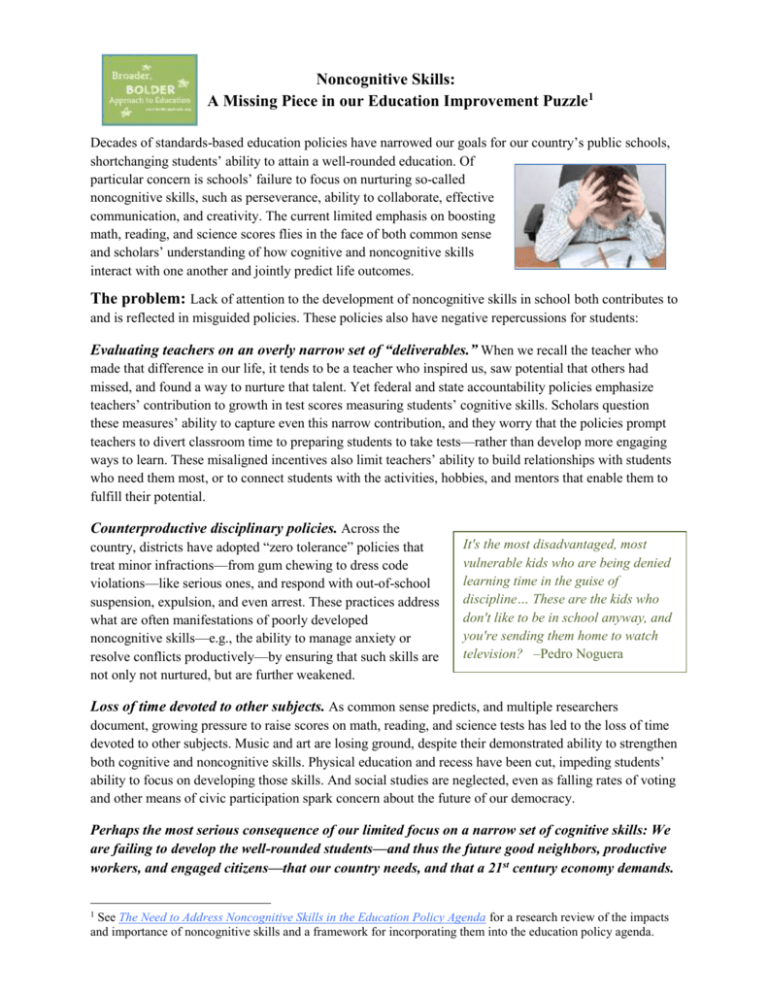
Noncognitive Skills: A Missing Piece in our Education Improvement Puzzle1 Decades of standards-based education policies have narrowed our goals for our country’s public schools, shortchanging students’ ability to attain a well-rounded education. Of particular concern is schools’ failure to focus on nurturing so-called noncognitive skills, such as perseverance, ability to collaborate, effective communication, and creativity. The current limited emphasis on boosting math, reading, and science scores flies in the face of both common sense and scholars’ understanding of how cognitive and noncognitive skills interact with one another and jointly predict life outcomes. The problem: Lack of attention to the development of noncognitive skills in school both contributes to and is reflected in misguided policies. These policies also have negative repercussions for students: Evaluating teachers on an overly narrow set of “deliverables.” When we recall the teacher who made that difference in our life, it tends to be a teacher who inspired us, saw potential that others had missed, and found a way to nurture that talent. Yet federal and state accountability policies emphasize teachers’ contribution to growth in test scores measuring students’ cognitive skills. Scholars question these measures’ ability to capture even this narrow contribution, and they worry that the policies prompt teachers to divert classroom time to preparing students to take tests—rather than develop more engaging ways to learn. These misaligned incentives also limit teachers’ ability to build relationships with students who need them most, or to connect students with the activities, hobbies, and mentors that enable them to fulfill their potential. Counterproductive disciplinary policies. Across the country, districts have adopted “zero tolerance” policies that treat minor infractions—from gum chewing to dress code violations—like serious ones, and respond with out-of-school suspension, expulsion, and even arrest. These practices address what are often manifestations of poorly developed noncognitive skills—e.g., the ability to manage anxiety or resolve conflicts productively—by ensuring that such skills are not only not nurtured, but are further weakened. It's the most disadvantaged, most vulnerable kids who are being denied learning time in the guise of discipline… These are the kids who don't like to be in school anyway, and you're sending them home to watch television? –Pedro Noguera Loss of time devoted to other subjects. As common sense predicts, and multiple researchers document, growing pressure to raise scores on math, reading, and science tests has led to the loss of time devoted to other subjects. Music and art are losing ground, despite their demonstrated ability to strengthen both cognitive and noncognitive skills. Physical education and recess have been cut, impeding students’ ability to focus on developing those skills. And social studies are neglected, even as falling rates of voting and other means of civic participation spark concern about the future of our democracy. Perhaps the most serious consequence of our limited focus on a narrow set of cognitive skills: We are failing to develop the well-rounded students—and thus the future good neighbors, productive workers, and engaged citizens—that our country needs, and that a 21st century economy demands. 1 See The Need to Address Noncognitive Skills in the Education Policy Agenda for a research review of the impacts and importance of noncognitive skills and a framework for incorporating them into the education policy agenda. The solution: The impact of noncognitive skills on both school and work success, and on broader life outcomes, has long been recognized. Parents and teachers join psychologists, sociologists, and, recently, neurologists in urging schools to treat cognitive and noncognitive skills as the interconnected domains that they are. Those designing policies must reengage on the issue and shift strategies to ensure schools have the resources and supports necessary to nurture these skills. Specifically, policymakers should: Learn from nontraditional education contexts. While noncognitive skills get short shrift in traditional K–12 settings, research has informed the development of policies and programs in other contexts. Early childhood education experts emphasize the use of playtime to develop such skills as collaboration, self-control, and creativity. After school hours and over the summer, enrichment programs take a whole-child approach that seeks both cognitive and noncognitive gains. And the special education field has led the way in developing project-based learning to engage and leverage each child’s unique strengths and needs. These lessons should inform, and be embedded in, K–12 policies. Build on momentum to broaden accountability and disciplinary policies. Narrow accountability measures and harsh and inequitable disciplinary policies have failed to improve learning and produced negative consequences. Growing recognition of the damage has spurred teachers, parents, and students to call for a different, supports-based approach in both arenas. States and districts are working with education experts to pilot accountability systems that focus on teacher preparation, recruitment, and retention; that emphasize support rather than punishment; and that pay attention to the entire school and district ecosystem. New York City and Montgomery County, Maryland, are among a growing list of school districts shifting course on disciplinary strategies in order to attend to and nurture noncognitive skills. They are supported by the federal Department of Education’s attention to, and new guidelines on, disciplinary practices. More districts should follow their example. Follow district-level models and advocate for supportive state and federal policies. For example, the Collaborative for Academic, Social, and Emotional Learning (CASEL) has developed pilot efforts from which other districts can learn and adapt through its Collaborating Districts Initiative. Such pilots are supported by federal 21st Century Learning Center grants, and can be buttressed by state-level policies like the New York Board of Regents’ Social and Emotional Development and Learning guidelines. Philanthropic efforts should be channeled to help scale up, expand, and evaluate district-level work, and to help districts advocate for supportive, well-aligned state and federal policies. Austin Independent School District is … one of the first districts in the nation to commit to the development of the whole child by incorporating social and emotional learning [through] three core areas: positive culture and climate, Social-Emotional Learning [SEL] skill and concept integration, and explicit SEL instruction. -CASEL Researchers and those closest to students - their parents and teachers - have long understood the need for healthy development of noncognitive skills. Indeed, trying to boost test scores and graduation rates without nurturing the skills that enable them is like building a house without first laying the foundation. Policymakers must acknowledge this reality. Doing so is critical to ensuring that schools have the tools they need to deliver all students the broad, stimulating, enriching educational experiences that make for well-developed children and fully educated adults. The Broader Bolder Approach to Education is a national campaign that acknowledges the impact of social and economic disadvantage on schools and students and proposes evidence-based policies to improve schools and remedy conditions that limit many children’s readiness to learn. www.boldapproach.org
